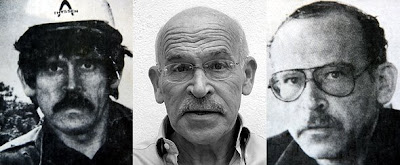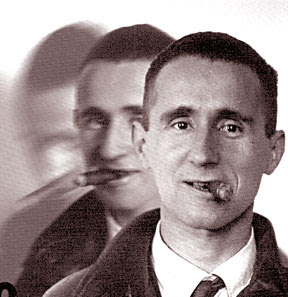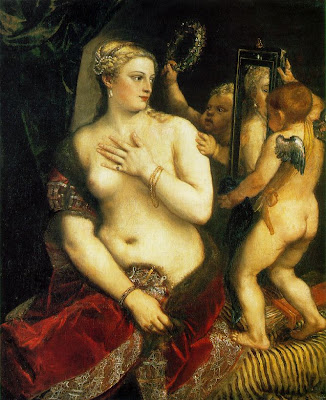Gonzo Series (9 / 9)
9. Epilogue
gonzo journalism is not like a fish in the sand outside the universe of HST. On the contrary, there is a great tradition of writers and journalists who have used the method gonzo (the need to be part of something to tell) , not always gonzo journalism to explain their stories for different purposes : embrace progress and to denounce injustice, or as a vehicle of personal expression and self-centered, indifferent to any collective transition. Within the catch-all gonzo , often filled with diverse and disordered materials of different nature, involvement and goals, it opens a vast field for work of collection and classification of journalistic materials, with the aim of paying tribute to their precursors (Nelly Bly or Egon Erwin Kisch, for example) and draw a timeline more legitimate and less reductionist and anchored to HST.
However, the panoramic gonzo so attractive in a bygone, reveals in this this genre was a disaffection alternative newspaper. Today gonzo journalism has become a fixture mostly timely for the showcasing of journalists who aspire to star. Exist in the network (control space ideal for gonzo ) and in print (not their presence has been remarkable and today, reportorial tradition is in its low hours), include a few names like Matt Taibbi and classics like Wallraff, still soldier on, but certainly their use is much higher in the audiovisual, especially as a means of expression of the reporter and satirical humor, style, CQC, or documentary as Michael Moore, a true master in the audiovisual field, and betting as Samanta Villar 21 days. On the other hand, it is shocking regression of journalism that has cornered the ambition be part of something to narrate, to be involved to explain in some radical alternative, more of a subgenre like gonzo not of journalism as a whole.

Also, gonzo journalism is a label that encompasses and complements late journalist embedded , investigative reporter, journalist undercover ... quite normally. Similarly, gonzo journalism, recovery from tradition muckracker , owes much to The New Journalism, because without this new mentality the twist gonzo journalism would have been impossible. Moreover, from a literary perspective gonzo journalism gender has its roots in memoirs and autobiographies, land widely credited literature I but seasoned with some journalistic tools.
gonzo journalism , when the involvement is genuine and sincere, provides a unique perspective inaccessible to conventional reporting. The presence of the journalist in a first plane, raw and with privileged access to information also means a declaration of principles in the face more bureaucratic journalism office, against prefabricated and indolent visions of reality. Do not forget, then, that gonzo journalism is also an ideological and ethical as well as style. However, pollution is also common for journalists who put the desire to impress to inform those who favor the presence of the reporter ( Being There) to the facts themselves, the enthusiasm to be on what happens, journalism being a mere excuse to dive into a coveted lifestyle. Good journalism gonzo , in my opinion, should not ever putting in the final gunshot, the presence of journalists to the facts themselves, and fall into exaggerated autobiography, nor excessive play the yo-yo or uncover Pandora's box. gonzo journalism is a transitional period, with a flight path honest.

In the basement of gonzo journalism Also underlying the new paradigm of the postmodern condition: the discrediting of legitimate dissent and consensus. To announced the failure of the impossibility of settling any suit, the HST of collective memory in Las Vegas and its style of reporting more narcissistic stand decorated with postmodern buzzwords. The HST animal is eaten by a customization process, a radicalization of hedonistic values \u200b\u200band a legitimation of the pleasure we take up their routine style. The important thing is to be oneself, to certify the imposture of the authenticity and personality, be free and offender, as opposed to outdated forms of traditional media. HST, despite their phobias and political fanfare, the apparent descrispación involved in political and ideological positions, a sort of political nihilism, but you can always give a twist and to present diametrically opposed. In Günter Wallraff, the other pole of gonzo journalism , recipes and diluted postmodern revolution and progress are not buried in a relentless retreat on this: there is outdated, but still useful, class consciousness, so little chic today against because you're worth. In mainstream journalism gonzo absorbs the direct emotion transitive discourse, ascribing to the release of I and autonomy of journalism aseptic still hegemonic, seeking a balance moderate a mobile reality we try to adapt and bend the algae under the impulse of the currents.
However, the panoramic gonzo so attractive in a bygone, reveals in this this genre was a disaffection alternative newspaper. Today gonzo journalism has become a fixture mostly timely for the showcasing of journalists who aspire to star. Exist in the network (control space ideal for gonzo ) and in print (not their presence has been remarkable and today, reportorial tradition is in its low hours), include a few names like Matt Taibbi and classics like Wallraff, still soldier on, but certainly their use is much higher in the audiovisual, especially as a means of expression of the reporter and satirical humor, style, CQC, or documentary as Michael Moore, a true master in the audiovisual field, and betting as Samanta Villar 21 days. On the other hand, it is shocking regression of journalism that has cornered the ambition be part of something to narrate, to be involved to explain in some radical alternative, more of a subgenre like gonzo not of journalism as a whole.

Also, gonzo journalism is a label that encompasses and complements late journalist embedded , investigative reporter, journalist undercover ... quite normally. Similarly, gonzo journalism, recovery from tradition muckracker , owes much to The New Journalism, because without this new mentality the twist gonzo journalism would have been impossible. Moreover, from a literary perspective gonzo journalism gender has its roots in memoirs and autobiographies, land widely credited literature I but seasoned with some journalistic tools.
gonzo journalism , when the involvement is genuine and sincere, provides a unique perspective inaccessible to conventional reporting. The presence of the journalist in a first plane, raw and with privileged access to information also means a declaration of principles in the face more bureaucratic journalism office, against prefabricated and indolent visions of reality. Do not forget, then, that gonzo journalism is also an ideological and ethical as well as style. However, pollution is also common for journalists who put the desire to impress to inform those who favor the presence of the reporter ( Being There) to the facts themselves, the enthusiasm to be on what happens, journalism being a mere excuse to dive into a coveted lifestyle. Good journalism gonzo , in my opinion, should not ever putting in the final gunshot, the presence of journalists to the facts themselves, and fall into exaggerated autobiography, nor excessive play the yo-yo or uncover Pandora's box. gonzo journalism is a transitional period, with a flight path honest.

In the basement of gonzo journalism Also underlying the new paradigm of the postmodern condition: the discrediting of legitimate dissent and consensus. To announced the failure of the impossibility of settling any suit, the HST of collective memory in Las Vegas and its style of reporting more narcissistic stand decorated with postmodern buzzwords. The HST animal is eaten by a customization process, a radicalization of hedonistic values \u200b\u200band a legitimation of the pleasure we take up their routine style. The important thing is to be oneself, to certify the imposture of the authenticity and personality, be free and offender, as opposed to outdated forms of traditional media. HST, despite their phobias and political fanfare, the apparent descrispación involved in political and ideological positions, a sort of political nihilism, but you can always give a twist and to present diametrically opposed. In Günter Wallraff, the other pole of gonzo journalism , recipes and diluted postmodern revolution and progress are not buried in a relentless retreat on this: there is outdated, but still useful, class consciousness, so little chic today against because you're worth. In mainstream journalism gonzo absorbs the direct emotion transitive discourse, ascribing to the release of I and autonomy of journalism aseptic still hegemonic, seeking a balance moderate a mobile reality we try to adapt and bend the algae under the impulse of the currents.
"I hope you enjoy reading this as much as I enjoyed writing it."
HST































